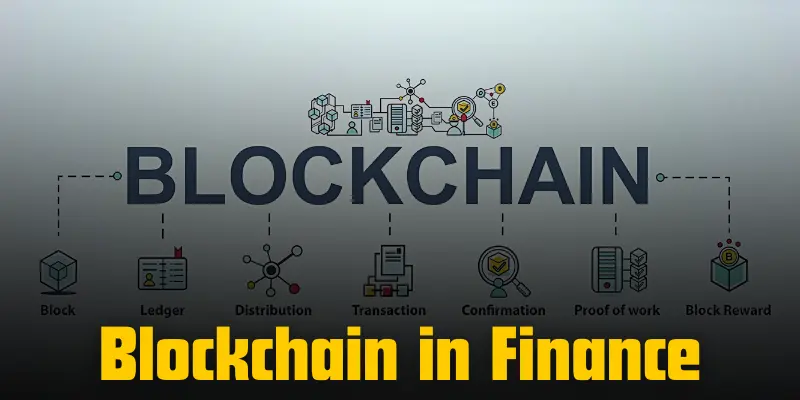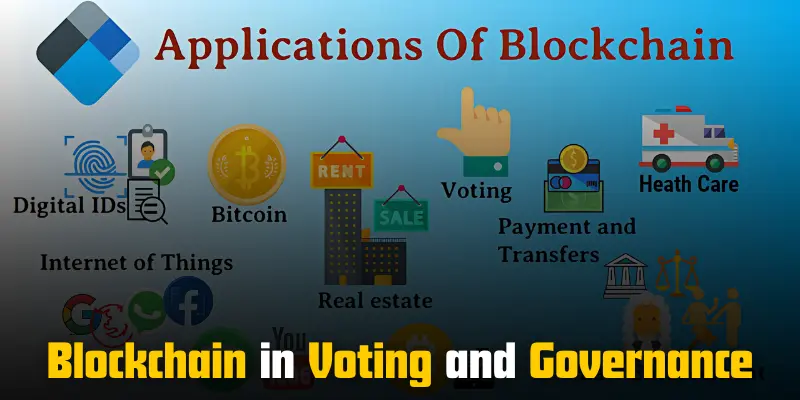Exploring Blockchain Uses and Applications Across Industries
Published: 9 Mar 2025
Blockchain technology is revolutionizing how businesses operate across the globe. Originally developed to support cryptocurrencies like Bitcoin, its uses and applications now extend far beyond digital currencies. Blockchain is being applied in finance, supply chains, healthcare, voting systems, and many other industries. With its decentralized and transparent nature, blockchain has the potential to streamline processes, improve security, and increase efficiency.
Introduction
Blockchain is a digital technology that allows data to be stored across a network of computers in a secure and transparent way. Think of it as a digital ledger where information is recorded in “blocks” and linked together in a chain. Every time a new transaction or piece of data is added, it is verified and stored securely. The main feature of blockchain is that once data is entered, it cannot be changed or tampered with, ensuring its security.
Blockchain has the power to revolutionize many industries by making processes more transparent, secure, and efficient. It’s most commonly known for supporting cryptocurrencies like Bitcoin, but its potential goes far beyond digital money. Blockchain can be used to track goods in supply chains, protect sensitive healthcare data, improve voting systems, and much more.
The goal of this blog is to explore the real-world of Blockchain Uses and Applications. We will dive into how blockchain is transforming various industries and why it’s becoming a key player in improving everyday processes.
Blockchain in Finance

Cryptocurrency and Payments
Blockchain is the backbone of cryptocurrencies like Bitcoin and Ethereum. It allows these digital currencies to exist and be traded securely. Here’s how it works:
- No middlemen: Blockchain allows users to send and receive digital money directly to each other without the need for a bank.
- Secure transactions: Each transaction is verified through blockchain’s decentralized network, making it safe and resistant to fraud.
- Global payments: Blockchain enables cross-border payments, reducing the time and cost of international money transfers.
Example: With Bitcoin, you can send money from one person to another anywhere in the world without needing a bank as an intermediary, making transactions faster and cheaper.
Banking and Financial Services
Blockchain technology is transforming the way traditional financial services operate, especially in banking. It helps make processes faster, cheaper, and more transparent.
- Faster transactions: Blockchain eliminates the need for intermediaries like banks, speeding up transaction times.
- Lower fees: By cutting out the middleman, blockchain reduces the fees that banks and financial institutions charge.
- Improved transparency: All transactions on blockchain are publicly available and immutable, reducing the chance of errors or fraud.
Example: Ripple uses blockchain to facilitate international money transfers, enabling quicker, cheaper, and more reliable payments between different currencies and countries.
Decentralized Finance (DeFi)
Decentralized Finance, or DeFi, is an emerging trend powered by blockchain technology. It’s creating new ways to access financial services without traditional banks.
- No banks involved: DeFi eliminates the need for banks, offering financial services like loans and savings on decentralized platforms.
- Smart contracts: Blockchain-based smart contracts automatically execute financial agreements without human involvement.
- Increased access: DeFi allows anyone with an internet connection to access financial services, regardless of location.
Example: In DeFi, users can lend or borrow money without the need for a bank. Platforms like Aave and Compound use blockchain to provide these services, making it possible for anyone to participate in lending and borrowing globally.
Blockchain in Supply Chain Management
Tracking Goods
Blockchain is revolutionizing the way products are tracked through the supply chain by providing an immutable, transparent record of each step in the product’s journey.
- Real-time tracking: Blockchain enables companies to track products from the manufacturer to the consumer in real-time, ensuring accurate records at every stage.
- Secure data sharing: All participants in the supply chain can access the same information, ensuring that data is shared securely and reliably.
- Accountability: Each transaction or movement is recorded on the blockchain, holding all parties accountable for their role in the supply chain.
Example: Walmart uses blockchain to trace the origins of food products, allowing consumers to know where their food comes from, how it was handled, and whether it’s safe. This ensures the food is fresh and properly handled, building trust with customers.
Improving Transparency and Efficiency
Blockchain is helping to improve transparency and efficiency in the supply chain by reducing fraud and streamlining processes.
- Tamper-proof records: Since blockchain records cannot be altered, it ensures that all data is accurate and trustworthy, reducing the chances of fraud.
- Faster processes: Blockchain eliminates the need for multiple intermediaries, making processes faster and more efficient.
- Cost savings: By reducing errors, fraud, and the need for middlemen, blockchain helps cut costs across the supply chain.
Example: IBM’s Food Trust Blockchain allows food producers, distributors, and retailers to share information about the products in their supply chains securely. It reduces waste, ensures food safety, and speeds up the tracking process, which benefits both businesses and consumers.
Blockchain in Healthcare
Storing Medical Records
Blockchain is helping to keep medical data secure and easily accessible by providing a decentralized, transparent, and immutable system for storing patient information.
- Patient-controlled data: Patients have full control over their health data, deciding who can access it and when.
- Secure storage: Blockchain ensures that medical records are encrypted and stored in a way that prevents unauthorized access or tampering.
- Easy access for healthcare providers: Doctors and hospitals can securely access a patient’s medical history, improving treatment decisions and patient care.
Example: Blockchain enables patients to control their own health data, giving them the ability to share it with healthcare providers as needed. This improves privacy and access to important medical information.
Drug Supply Chain Integrity
Blockchain can help ensure the integrity of the drug supply chain by tracking medicines from production to delivery, preventing counterfeit drugs from entering the market.
- Transparent tracking: Every step in the drug’s journey is recorded on the blockchain, providing full transparency about its origin, handling, and distribution.
- Tamper-proof records: Since blockchain records cannot be altered, it ensures the authenticity of the drugs, reducing the risk of counterfeit products.
- Improved compliance: Blockchain helps pharmaceutical companies and regulators track and ensure that drugs meet safety standards.
Example: Pharmaceutical companies use blockchain to track the journey of drugs, ensuring that only legitimate, safe medicines reach consumers. This helps protect patients from counterfeit drugs and improves the overall safety of the supply chain.
Blockchain in Voting and Governance

Secure Voting Systems
Blockchain has the potential to revolutionize voting systems by providing a secure and transparent way to conduct elections, ensuring the integrity of the vote.
- Transparency: All votes cast on a blockchain system are publicly recorded and immutable, making it impossible to alter or tamper with votes.
- Enhanced security: Blockchain’s encryption and decentralized nature make it resistant to hacking and fraud, offering a secure platform for voters.
- Remote voting: Blockchain can facilitate mobile or online voting, making elections more accessible and convenient while maintaining security.
Example: The Voatz platform uses blockchain to allow secure mobile voting, enabling people to vote from their smartphones. This system ensures transparency, security, and ease of access, particularly useful in remote or absentee voting situations.
Smart Contracts in Governance
Blockchain-based smart contracts can automate and enforce agreements in governance, reducing the need for intermediaries and making processes more efficient.
- Self-executing contracts: Smart contracts automatically execute when predetermined conditions are met, reducing delays and human errors.
- Transparency and accountability: Since smart contracts are recorded on the blockchain, all actions taken are transparent and traceable.
- Cost-effective: By removing intermediaries, smart contracts can lower the costs of executing agreements.
Example: Smart contracts are used in property sales, where the transfer of ownership happens automatically once both parties meet the agreed terms. Similarly, blockchain can be used in government benefits to automatically process claims and payments based on eligibility criteria.
Blockchain in Intellectual Property (IP) Protection
Protecting Digital Content
Blockchain can play a major role in protecting digital content by ensuring creators maintain control over their work and receive fair compensation.
- Copyright protection: Blockchain provides an immutable record of ownership for digital content, making it harder for unauthorized parties to steal or reproduce it.
- Transparent royalty tracking: Creators and artists can see exactly how their content is being used and how much they are earning from royalties.
- Automated payments: Blockchain can ensure automatic and accurate payments for content usage, reducing delays or errors.
Example: In the music industry, blockchain is used to track royalties for songs. Platforms like Ujo Music use blockchain to ensure that artists are paid fairly and promptly every time their music is streamed or sold.
Tokenizing Assets
Blockchain can tokenize intellectual property, turning it into digital assets that can be easily bought, sold, or transferred.
- Ownership representation: Blockchain allows for the creation of digital tokens that represent ownership of intellectual property like patents, trademarks, or digital art.
- Increased liquidity: Tokenizing IP makes it easier to buy, sell, or license intellectual property without going through traditional channels.
- Simplified transfer: Blockchain makes transferring ownership of IP assets faster and more secure.
Example: Non-Fungible Tokens (NFTs) have become a popular way to represent ownership of digital art. NFTs use blockchain to prove the authenticity and ownership of the art, allowing artists to sell their work directly to buyers without intermediaries.
Blockchain in Identity Management
Digital Identity Verification
Blockchain can securely verify digital identities, making it easier to prove who you are online without relying on third parties.
- Decentralized control: Blockchain allows individuals to control their own identity data, eliminating the need for central organizations to store personal information.
- Immutable records: Once data is added to the blockchain, it cannot be changed or tampered with, ensuring its authenticity.
- Secure and transparent: Blockchain’s encrypted data and public ledger make the identity verification process secure and transparent.
Example: Estonia’s e-Residency program allows individuals to verify their identity digitally, giving them access to government services and online business opportunities. The blockchain system ensures the security and authenticity of the data shared.
Reducing Identity Theft
Blockchain helps protect personal information from hackers by storing data in a secure, decentralized system.
- Data encryption: Personal data on blockchain is encrypted, making it difficult for unauthorized parties to access it.
- Self-sovereign identity: Blockchain allows individuals to own and control their own identity, limiting the risk of identity theft.
- No single point of failure: Since blockchain is decentralized, there is no central database for hackers to target, reducing the risk of large-scale data breaches.
Example: Self-sovereign identity systems, powered by blockchain, enable users to securely store and control their identity data. This reduces the chances of personal information being stolen or misused, as individuals decide who can access their data.
Conclusion
So guys, in this article, we’ve covered Blockchain Uses and Applications in detail. As we’ve seen, blockchain has the potential to transform many industries, from finance and healthcare to voting systems and intellectual property protection.
My personal recommendation is to start learning more about how blockchain can benefit your business or personal projects. It’s a technology that’s here to stay and could offer great opportunities. So, dive deeper into blockchain today and explore how it can be applied to solve real-world problems!
Frequently Asked Questions About Blockchain Uses and Applications
Blockchain is a digital ledger technology that records information in a secure, transparent, and decentralized way. Each piece of data is stored in “blocks” and linked together, forming a chain. This technology is most commonly associated with cryptocurrencies but has applications in many industries.
Blockchain works by recording data in a network of computers rather than a central server. When a transaction occurs, it is verified by multiple participants in the network. Once verified, the data is stored in a block that is permanently added to the chain.
Blockchain is being used in various industries, including finance, healthcare, supply chains, voting systems, and intellectual property. It is particularly beneficial for industries that require secure, transparent record-keeping. The technology is still evolving and expanding into new sectors.
Yes, blockchain is highly secure. Each transaction is encrypted and linked to previous transactions, making it nearly impossible to alter. Additionally, because it’s decentralized, there is no central point of failure, reducing the risk of hacking.
Yes, many businesses are exploring blockchain to improve transparency, reduce costs, and enhance security. You can use it for things like tracking products in the supply chain or processing payments more efficiently. It’s a powerful tool, especially for businesses dealing with sensitive data.
Cryptocurrencies are digital currencies like Bitcoin and Ethereum that use blockchain technology to secure and verify transactions. Blockchain allows for peer-to-peer transactions without a central authority like a bank. It ensures that transactions are transparent, secure, and immutable.
A smart contract is a self-executing contract where the terms are directly written into code. Once the conditions are met, the contract automatically executes without needing a third party. It’s used to automate processes and reduce human error.
Yes, blockchain can significantly improve identity protection by giving individuals control over their data. It allows for secure, tamper-proof storage of identity information, reducing the risk of hacking or identity theft. Users decide who can access their personal data.
Bonus Points
- Security and Transparency: Blockchain offers an unprecedented level of security and transparency, making it a highly trusted technology for tracking transactions and records.
- Decentralization: It eliminates the need for intermediaries like banks, governments, or other third parties, reducing the risk of fraud and corruption.
- Faster Transactions: Blockchain enables faster transactions by removing manual processes and third-party approvals, especially in financial services and international money transfers.
- Smart Contracts: These self-executing contracts automatically execute terms when conditions are met, making processes more efficient and reducing human errors.
- Cost Efficiency: Blockchain reduces administrative costs by eliminating the need for intermediaries and minimizing paperwork, making transactions more cost-effective.
- Increased Accessibility: Blockchain can provide access to financial services and other applications to people in underserved regions where traditional systems are unavailable.
- Improved Supply Chain Management: By tracking goods in real-time, blockchain improves the accuracy and efficiency of supply chains, reducing fraud and errors.
- Intellectual Property Protection: Blockchain helps protect creators’ rights by providing clear, secure, and immutable records of digital content, ensuring fair compensation.
- Enhanced Privacy: With blockchain, users control their own data and can decide who has access to it, reducing the risk of identity theft and data breaches.
- Cross-Industry Innovation: From healthcare to voting and real estate, blockchain is continuously being adapted and implemented in new sectors, offering solutions to age-old problems.

- Be Respectful
- Stay Relevant
- Stay Positive
- True Feedback
- Encourage Discussion
- Avoid Spamming
- No Fake News
- Don't Copy-Paste
- No Personal Attacks

- Be Respectful
- Stay Relevant
- Stay Positive
- True Feedback
- Encourage Discussion
- Avoid Spamming
- No Fake News
- Don't Copy-Paste
- No Personal Attacks



